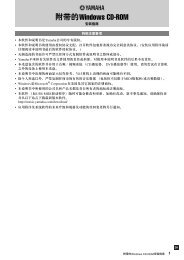7918KB - Yamaha
7918KB - Yamaha
7918KB - Yamaha
You also want an ePaper? Increase the reach of your titles
YUMPU automatically turns print PDFs into web optimized ePapers that Google loves.
PRECAUTIONS<br />
PLEASE READ CAREFULLY BEFORE PROCEEDING<br />
WARNING<br />
* Please keep these precautions in a safe place for future reference.<br />
Always follow the basic precautions listed below to avoid the possibility of serious injury or even death from electrical shock,<br />
short-circuiting, damages, fire or other hazards. These precautions include, but are not limited to, the following:<br />
• Do not open the instrument or attempt to disassemble the internal parts<br />
or modify them in any way. The instrument contains no user-serviceable<br />
parts. If it should appear to be malfunctioning, discontinue use immediately<br />
and have it inspected by qualified <strong>Yamaha</strong> service personnel.<br />
• Do not expose the instrument to rain, use it near water or in damp or<br />
wet conditions, or place containers on it containing liquids which might<br />
spill into any openings.<br />
• If the AC adaptor cord or plug becomes frayed or damaged, or if there is<br />
a sudden loss of sound during use of the instrument, or if any unusual<br />
smells or smoke should appear to be caused by it, immediately turn off<br />
CAUTION<br />
the power switch, disconnect the adaptor plug from the outlet, and<br />
have the instrument inspected by qualified <strong>Yamaha</strong> service personnel.<br />
• Use the specified adaptor (PA-6 or an equivalent recommended by<br />
<strong>Yamaha</strong>) only. Using the wrong adaptor can result in damage to the<br />
instrument or overheating.<br />
• Before cleaning the instrument, always remove the electric plug from<br />
the outlet. Never insert or remove an electric plug with wet hands.<br />
• Check the electric plug periodically and remove any dirt or dust which<br />
may have accumulated on it.<br />
Always follow the basic precautions listed below to avoid the possibility of physical injury to you or others, or damage to the<br />
instrument or other property. These precautions include, but are not limited to, the following:<br />
• Do not place the AC adaptor cord near heat sources such as heaters or<br />
radiators, and do not excessively bend or otherwise damage the cord,<br />
place heavy objects on it, or place it in a position where anyone could<br />
walk on, trip over, or roll anything over it.<br />
• When removing the electric plug from the instrument or an outlet, always<br />
hold the plug itself and not the cord.<br />
• Do not connect the instrument to an electrical outlet using a multipleconnector.<br />
Doing so can result in lower sound quality, or possibly cause<br />
overheating in the outlet.<br />
• Unplug the AC power adaptor when not using the instrument, or during<br />
electrical storms.<br />
• Always make sure all batteries are inserted in conformity with the +/–<br />
polarity markings. Failure to do so might result in overheating, fire, or<br />
battery fluid leakage.<br />
• Always replace all batteries at the same time. Do not use new batteries<br />
together with old ones. Also, do not mix battery types, such as alkaline<br />
batteries with manganese batteries, or batteries from different makers,<br />
or different types of batteries from the same maker, since this can<br />
cause overheating, fire, or battery fluid leakage.<br />
• Do not dispose of batteries in fire.<br />
• Do not attempt to recharge batteries that are not intended to be charged.<br />
• If the instrument is not to be in use for a long time, remove the batteries<br />
from it, in order to prevent possible fluid leakage from the battery.<br />
• Keep batteries away from children.<br />
• Before connecting the instrument to other electronic components, turn<br />
off the power for all components. Before turning the power on or off for<br />
all components, set all volume levels to minimum.<br />
• Do not expose the instrument to excessive dust or vibrations, or extreme<br />
cold or heat (such as in direct sunlight, near a heater, or in a car<br />
during the day) to prevent the possibility of panel disfiguration or damage<br />
to the internal components.<br />
• Do not use the instrument near other electrical products such as televisions,<br />
radios, or speakers, since this might cause interference which can<br />
affect proper operation of the other products.<br />
• Do not place the instrument in an unstable position where it might accidentally<br />
fall over.<br />
• Before moving the instrument, remove all connected adaptor and other<br />
cables.<br />
• When cleaning the instrument, use a soft, dry cloth. Do not use paint<br />
thinners, solvents, cleaning fluids, or chemical-impregnated wiping cloths.<br />
Also, do not place vinyl or plastic objects on the instrument, since this<br />
might discolor the panel or keyboard.<br />
• Do not rest your weight on, or place heavy objects on the instrument,<br />
and do not use excessive force on the buttons, switches or connectors.<br />
• Use only the stand specified for the instrument. When attaching the<br />
stand, use the provided screws only. Failure to do so could cause damage<br />
to the internal components or result in the instrument falling over.<br />
• Do not operate the instrument for a long period of time at a high or<br />
uncomfortable volume level, since this can cause permanent hearing<br />
loss. If you experience any hearing loss or ringing in the ears, consult a<br />
physician.<br />
■ SAVING USER DATA<br />
• Always save data to a floppy disk frequently, in order to help prevent<br />
the loss of important data due to a malfunction or user operating error.<br />
<strong>Yamaha</strong> cannot be held responsible for damage caused by improper use or<br />
modifications to the instrument, or data that is lost or destroyed.<br />
Always turn the power off when the instrument is not in use.<br />
Make sure to discard used batteries according to local regulations.<br />
(4)<br />
1


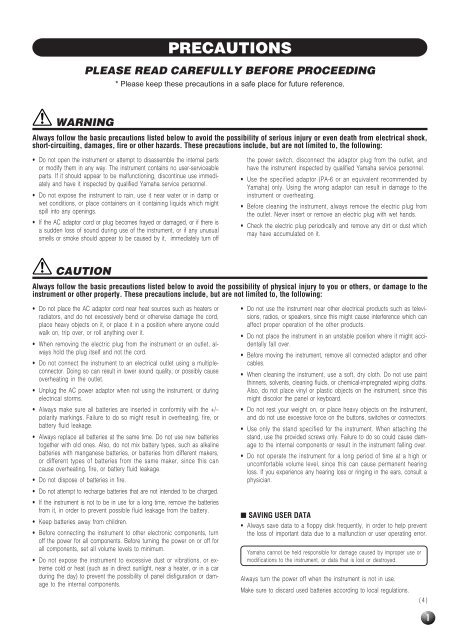
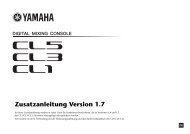
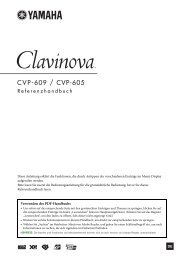
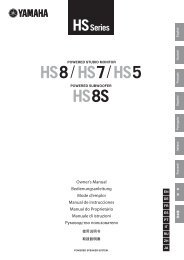
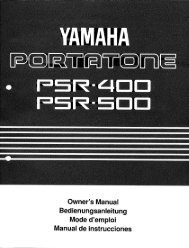
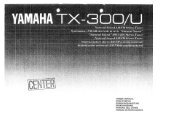
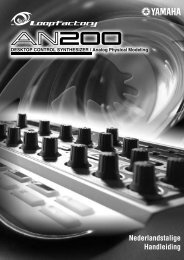
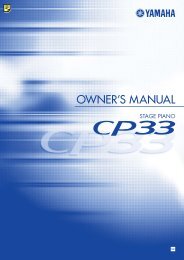


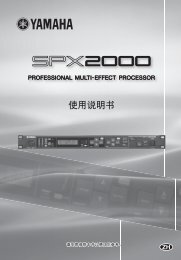
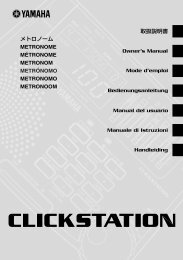
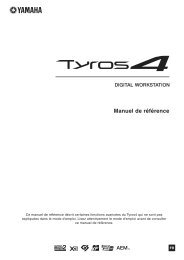
![Premere il pulsante [SONG] - Yamaha](https://img.yumpu.com/50419553/1/184x260/premere-il-pulsante-song-yamaha.jpg?quality=85)
